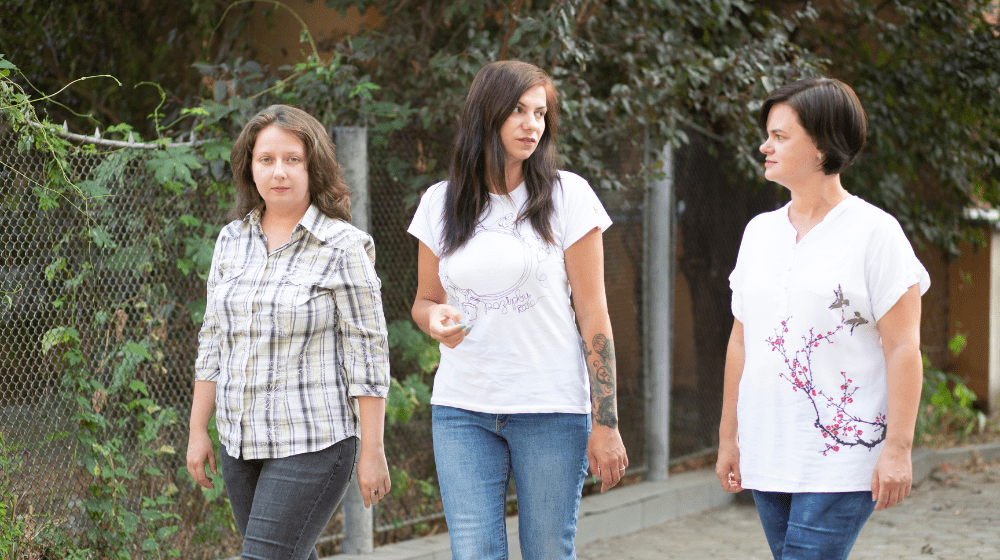Representatives of the Council of Women of the Donetsk Region talk about the war, their help for women, for youth and their active public work.
Iuliia Prudnikova, Executive Director of the Council of Women of the Donetsk Region NGO
Daria Markovych, Project Coordinator
Kateryna Steinberg, Communications Manager
Each of these women has their own personal story in this war, but each is sustained by the understanding that others need their help and care. They are from Mariupol, and at the beginning of the full-scale war, they hoped that the city of Mary was the safest place. But, when explosions began to sound nearby, air strikes hit neighbouring houses, and there was a catastrophic lack of water and food, our heroines were forced to take their relatives and flee through checkpoints under the threat of shelling.
Tell us, please, what do you remember about February 24, the day of the full-scale war beginning?
Kateryna recalls that at five o’clock in the morning she jumped out of bed. The old airport was about a kilometre from her house. There was rocket fire there and it was very, very loud: “We immediately understood that something bad had started. The Internet and the news were shouting that almost every city was being shelled, that a great war had begun. So it was very scary.”
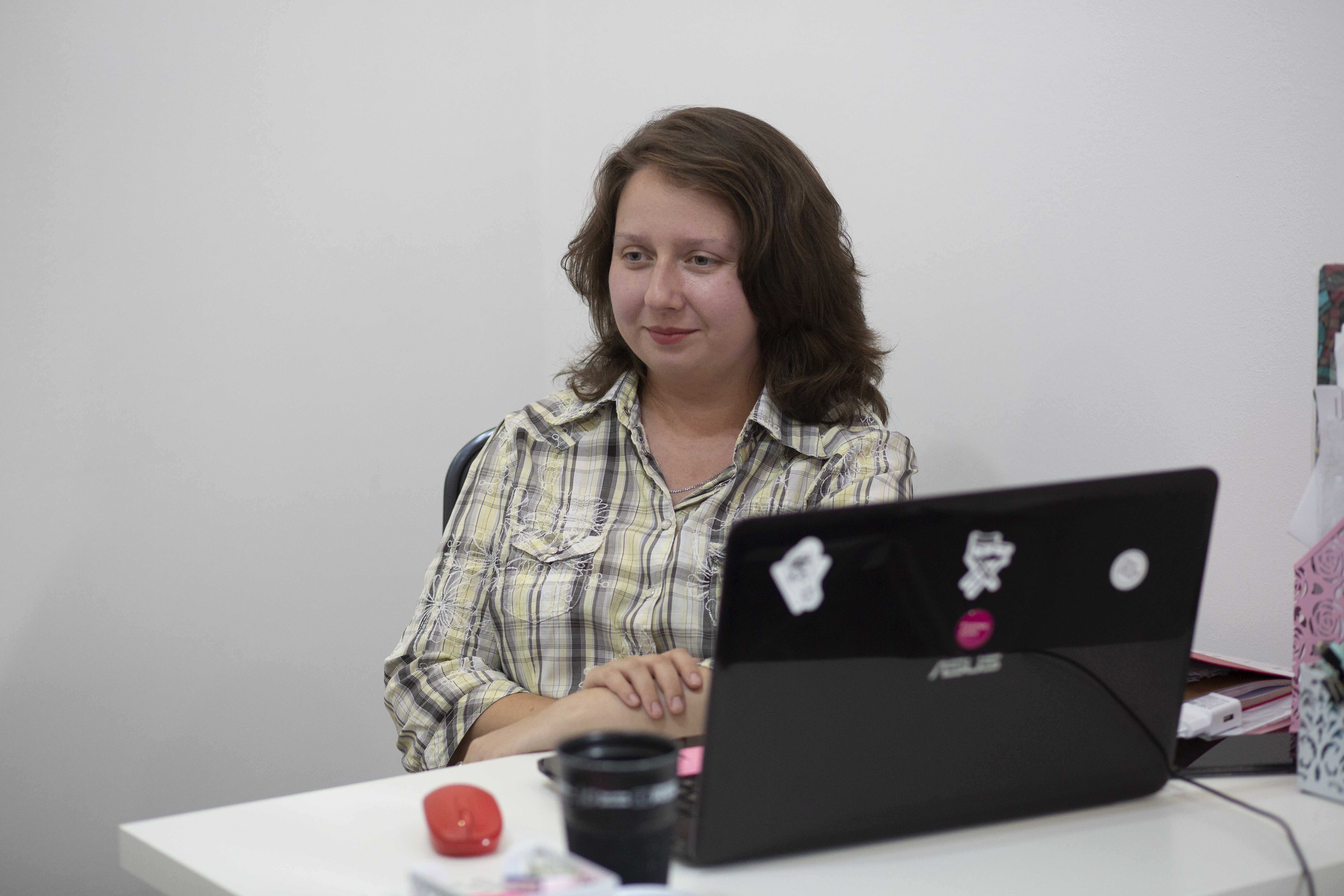
How did you tell the children that the war had started?
Iuliia said that at first they did not say that the war had started: “We started playing hide-and-seek with them, collected their favourite toys. We removed everything we did not need from the corridor and made a shelter there using large pillows. We took a sleeping bag and arranged it so that they did not feel that there was any danger at the moment. We could distract them until March 2, because there was still electricity and the Internet. They watched cartoons and played games and we played different games with them. But explosions were already audible and we tried to explain that we would protect them, that we were here, and that everything would be fine.”
What were your next steps?
“The firing was getting louder and louder. We also felt that planes were flying by. Although we were on the third floor, we could hear that the building was shaking and we realised that it was already dangerous to stay there. And of March 5, we decided that it would be more peaceful for us in the old centre of the city. My parents lived there and their house survived the Second World War of 1939–1945. That’s why we decided that it would be safer for us there,” Iuliia says.
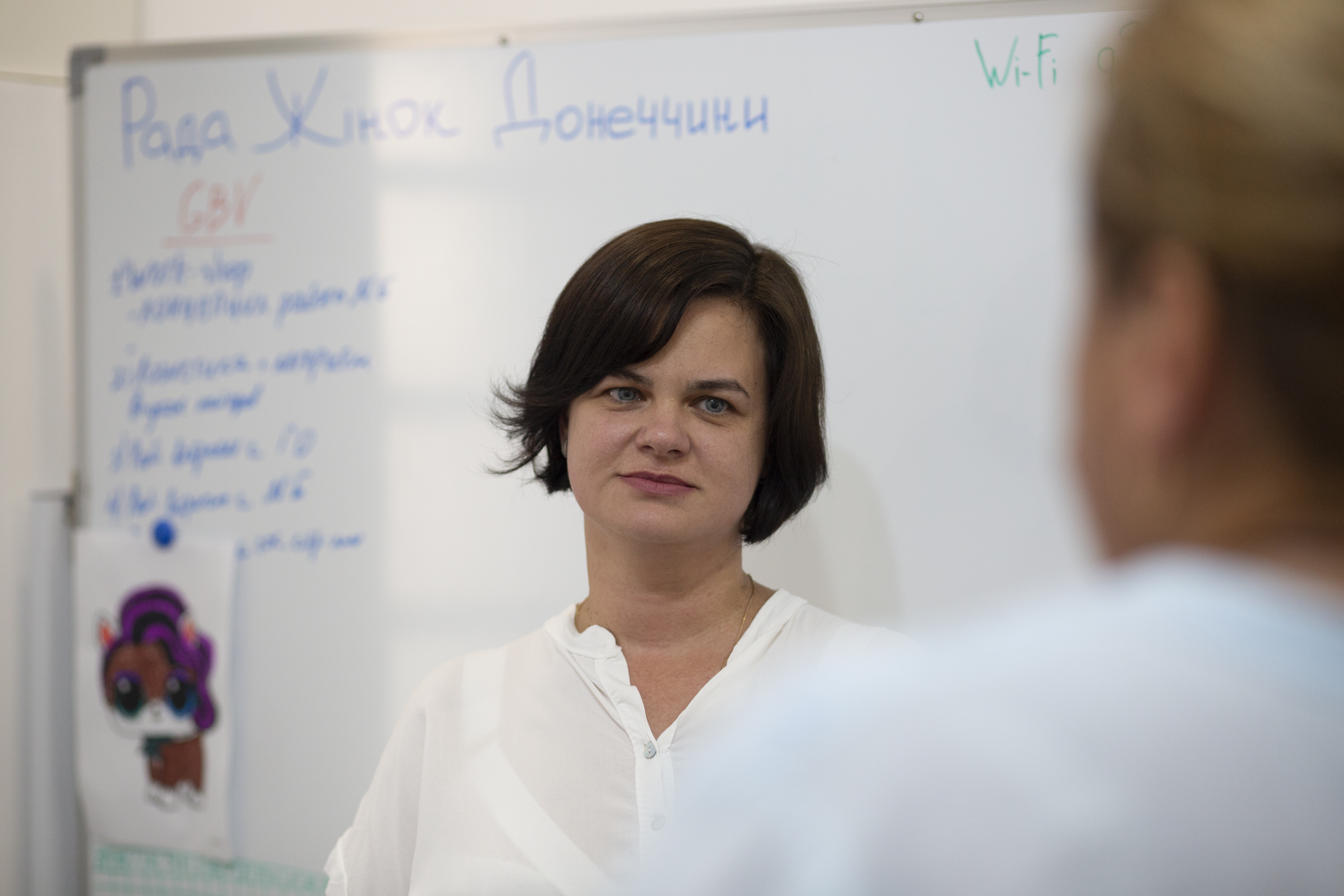
She hoped to leave Mariupol, because reports began to spread that people were gathering near the much-mourned Drama Theatre, as it was reported that a green corridor had been arranged for people to leave the city safely.
“But when we got there, we realized that there was no peace, that shelling was continuing, no one could guarantee safety, and there was no way to leave the city. And we returned to my parents. On March 8, a plane dropped an aerial bomb near the house. And I saw how all the windows in a five-storey building nearby were completely blown out. A horrifying moment for me was that half an hour before that I saw somebody near the window on the fifth floor. After that, we moved to the basement.”
A part of the team could not leave Mariupol for a long time, how did you survive there, for how long?
“Gas and electricity disappeared by the evening of March 5. We had not had electricity since the March 2,” Iuliia says: “We were cooking over an open fire. My parents were living in an old district with small two-and three-story buildings. People rallied together somehow, helped each other, looked for firewood, shared food, everything we had. Fortunately, almost everyone had food stored in refrigerators and when the electricity had gone, it was all moved to garages or sheds. It was freezing cold, so these products were preserved for some time, and we had the opportunity to eat. In one of the basements of the house, we were taking technical water. Water for drinking was taken from the well.”
How difficult was it to leave Mariupol?
Daria recalls; “When on March 16 we heard that there were some “green corridors”, that people were seen outside loading their things in vehicles and leaving, we packed our car, despite the risk. I put my mother, the cat, and a friend in the car and drove to territory controlled by Ukraine. The first village we reached was 20 km from the city. We drove 20 kilometres in 9 hours. There were Russian checkpoints, planes were flying, something was exploding in Mariupol. We saw this and it was very scary. The most humiliating thing was that they were taking away our phones and viewing the photos and messages. They were stripping the boys down to their underpants, searching for bruises from rifle butts, and tattoos that would show they belonged to the military.”
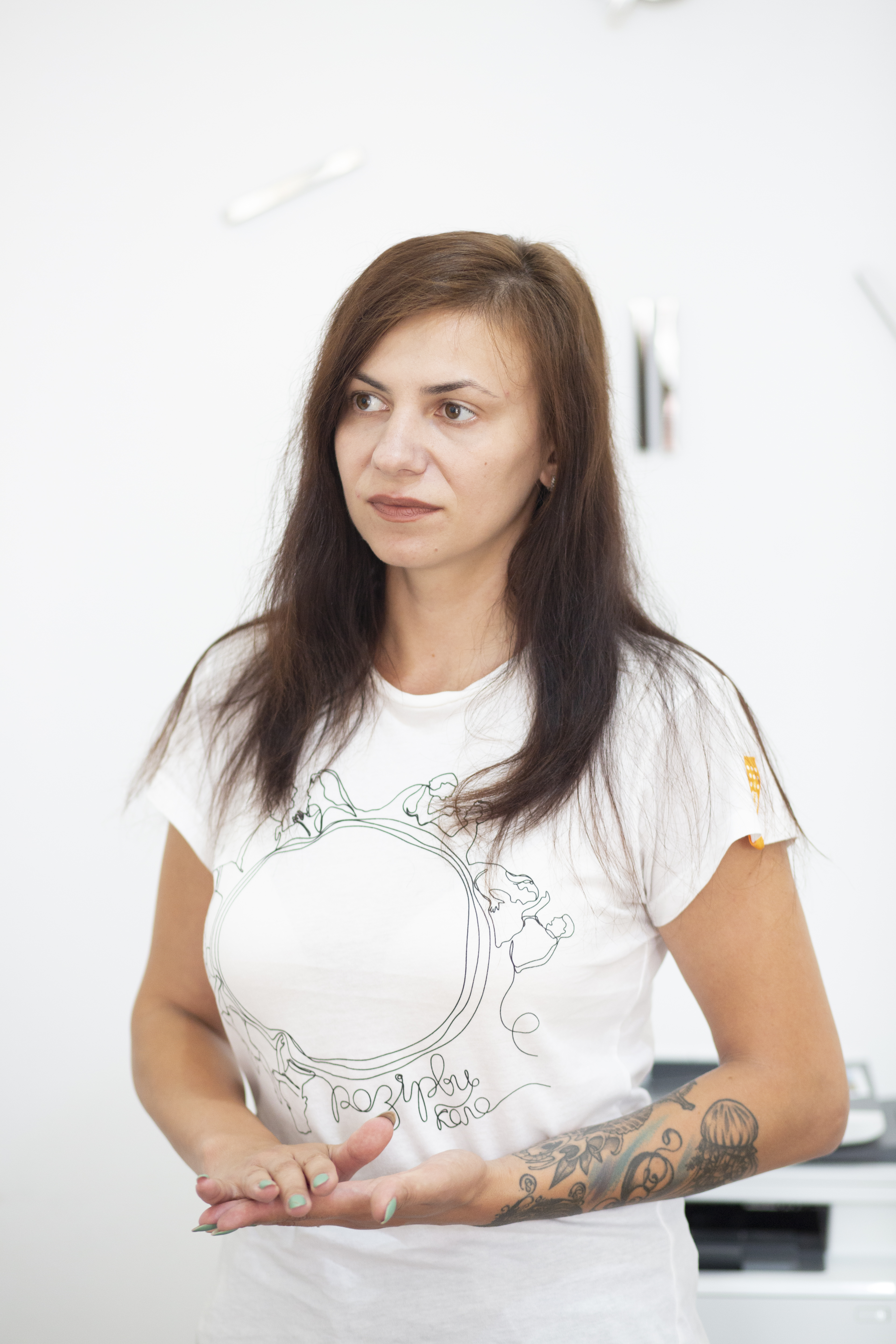
How did the war affect your work? What are you currently getting up to?
Kateryna answers that at first it was a little difficult to focus on work after the experience of living in Mariupol: “And you leave and they tell you: ‘Well, we are all very glad that you are alive, that you are with us, but the report must be prepared for February.’ This helped me return to a normal routine so that I knew what I needed, that I had a schedule, a plan, according to which I had to do something. Regardless of what happens around us, we need to convey the messages that we want to convey within the framework of our projects. I hope that my work has really helped someone. ”
How did the war affect the work of your organization? What are you currently working on?
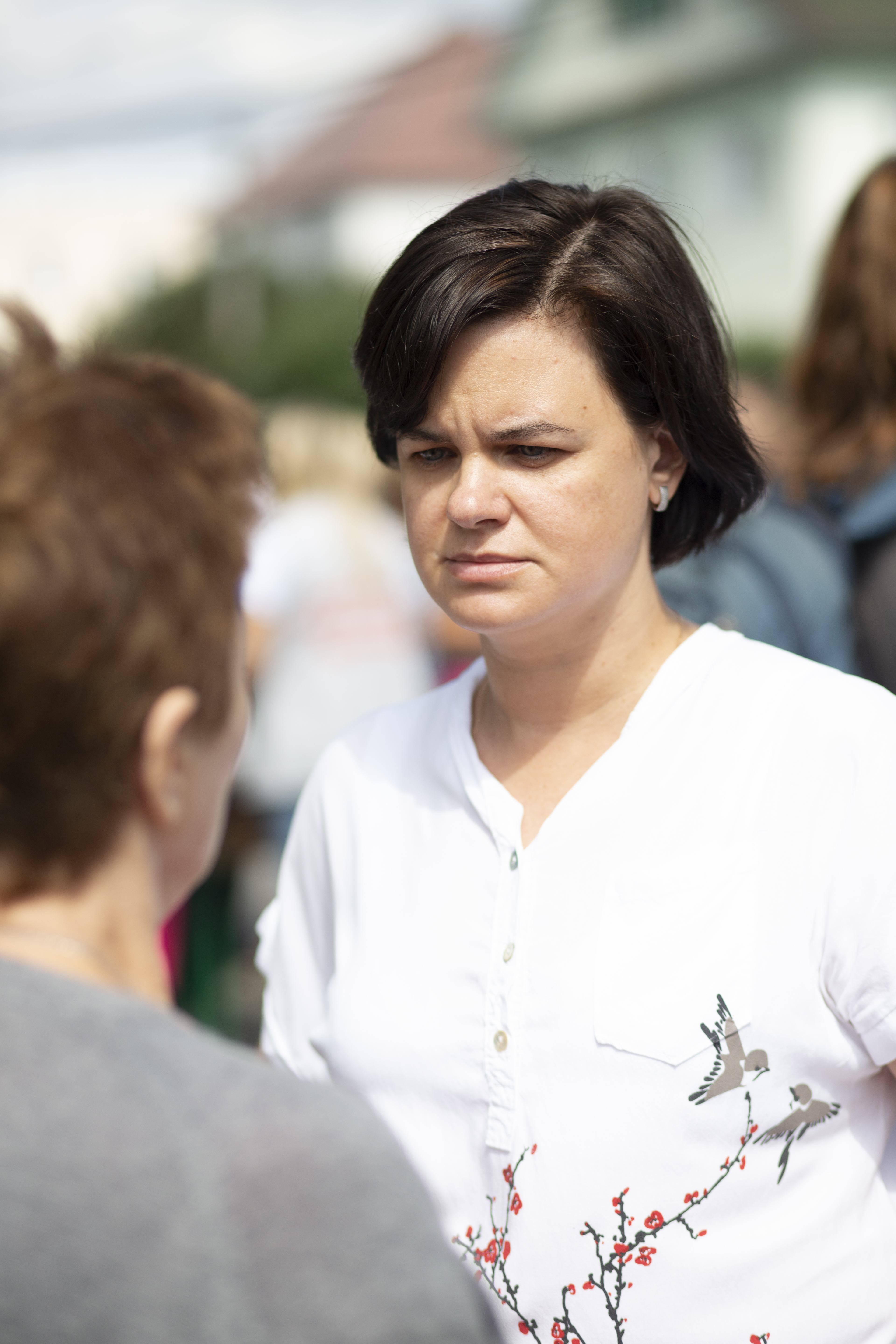
© UNFPAUkraine
According to Iuliia, cooperation with partners — the UN Population Fund — began at the end of 2014 in the city of Mariupol: “We started building a system with them, a comprehensive approach to solving women’s and girls’ problems related to domestic violence, gender-based violence. We managed to open a crisis centre for women of the city who suffered from domestic violence. In addition, we also worked with leaders of the youth movement who wanted to implement changes in their communities. These were small communities in the Luhansk, Donetsk, Zaporizhzhia, and Kherson regions. We had just got to know the Kherson region and we had big plans to help youth from this region as well. Because UNFPA decided to continue to cooperate with us and support our programmes, we are continuing this work in Zakarpattia region, but in a new format.”
Iuliia notes that her organization also continued to work with women and girls:
“We are currently in Zakarpattia and we want the system of assistance provision to victims of domestic and gender-based violence to work efficiently here as well. We are a new organization for this region, we know few people. Therefore, the first thing we started with was an assessment of the needs of women who had moved to Zakarpattia region
We want a woman to feel cared for, to be able to confide at some point, and to share what hurts her. Women can talk to psychologists and lawyers and get the necessary advice.”
Do victims of gender-based violence have access to specialized services under the current circumstances?
“Zakarpattia already has certain services, but all this is just begining to develop. Recently, a day centre for women who have suffered from violence was opened in the Uzhhorod community, but the region is large, there are many districts. It will never be too much,” Iuliia adds.

Have you had to transform some projects or urgently work on new tasks?
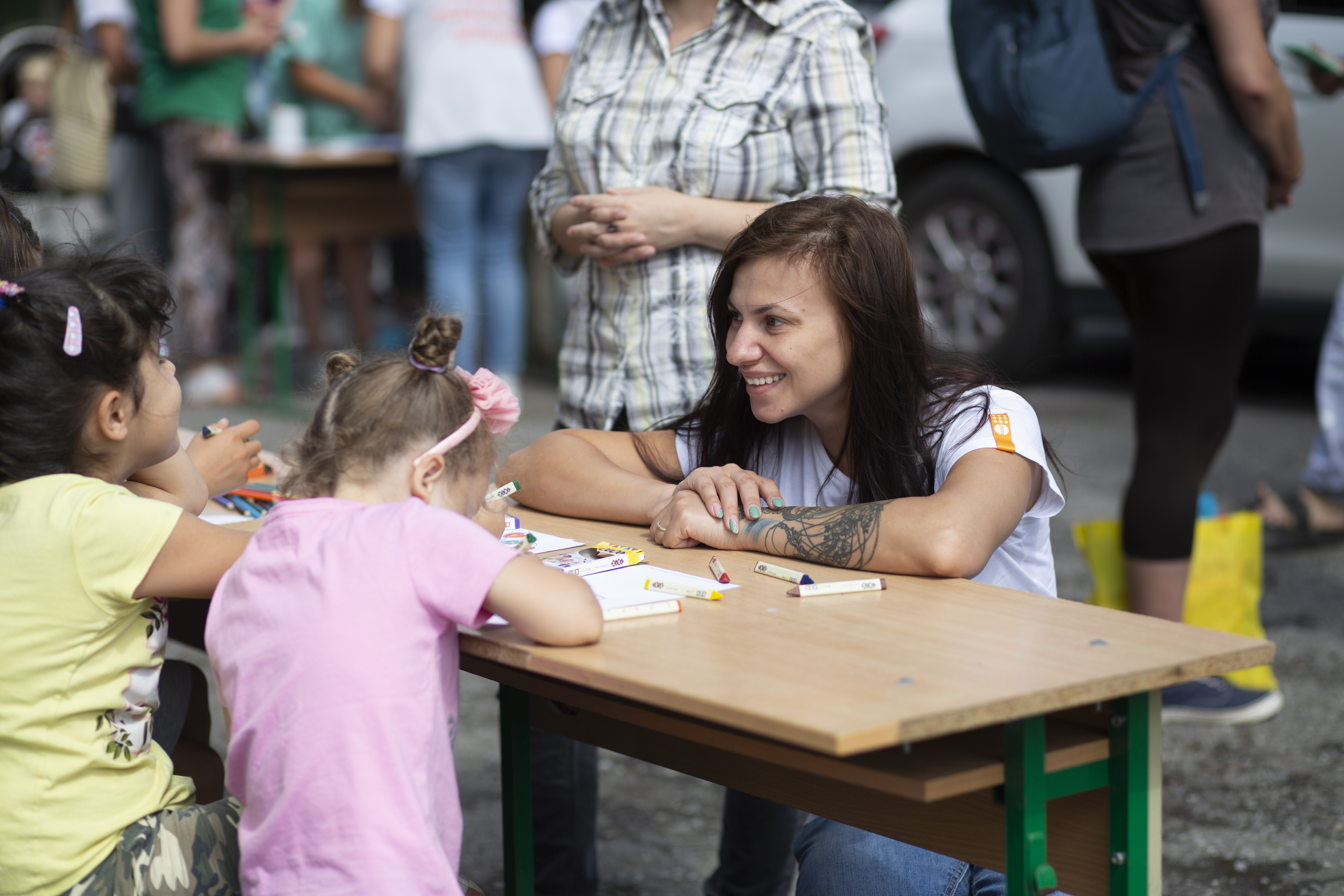
“I’ve never thought that in the 21st century it could happen that you would be left without information, ” Daria says:
“In Mariupol, we had no access to information, no Internet, no electricity. And in our organization we thought that people who go to territory under the control of the Ukrainian Government should get access to information. That is why we launched the #TURBOta youth programme within the framework of the United Nations Recovery and Peacebuilding Programme with the financial support of the European Union. We advised young people how to get to safe cities, how to pass checkpoints, where to find housing, shelter, food, clothes, how to restore documents, how to find relatives who have disappeared. This project is supportive for everyone”
This interview is conducted within United Nations Recovery and Peacebuilding Programme.
The United Nations Recovery and Peacebuilding Programme (UN RPP) is being implemented by four United Nations agencies: the United Nations
Development Programme (UNDP), the UN Entity for Gender Equality and the Empowerment of Women (UN Women), the United Nations Population Fund
(UNFPA) and the Food and Agriculture Organization of the United Nations (FAO).
Twelve international partners support the Programme: the European Union (EU), the European Investment Bank (EIB), the U.S. Embassy in Ukraine, and
the governments of Canada, Denmark, Germany, Japan, the Netherlands, Norway, Poland, Sweden & Switzerland.

